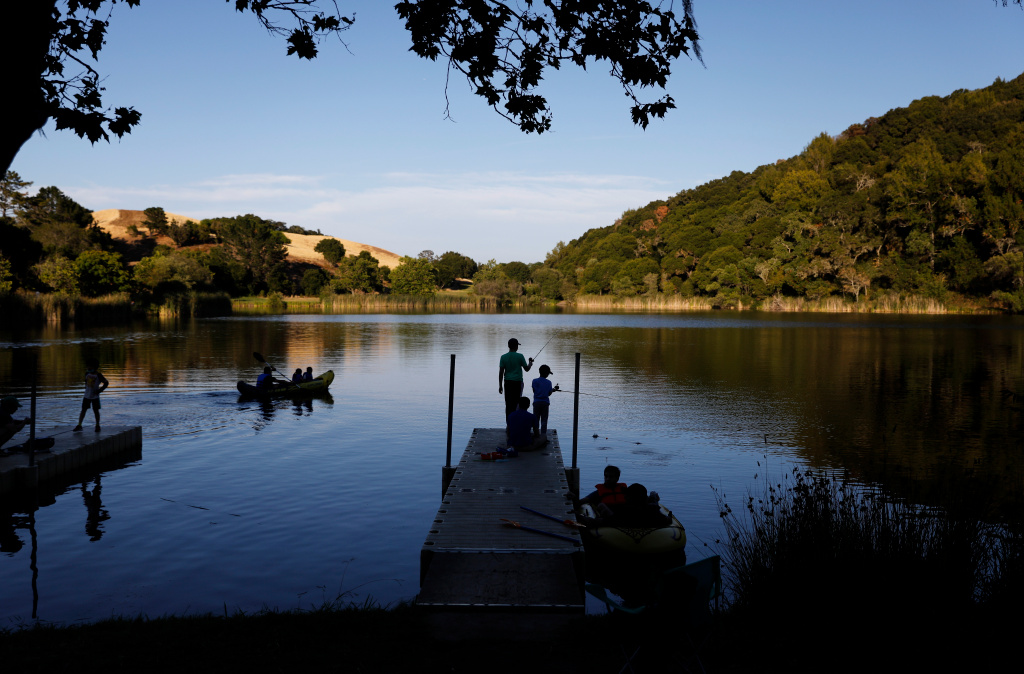PALO ALTO — City council members on Monday gave initial approval to overturn a controversial, decades-old policy that says only Palo Alto residents and their accompanied guests can enter the bucolic Foothills Park.
The decision is a victory for the NAACP of Silicon Valley and the ACLU of Northern California, who jointly filed a lawsuit a month and a half ago alleging that the policy is unconstitutional on First Amendment grounds and has discriminated against several Palo Alto residents and non-residents who’ve joined as plaintiffs.
In hopes of settling the suit, council members on Monday voted 5-2 — with Greg Tanaka and Lydia Kou dissenting — to open the park to all people, impose a limit of 750 visitors at any one time and refer renaming the park to city staff. The council also decided to allow residents first access to reservations for all park facilities.
The decision marks a turning point in decades of discussions, debates and proposals on opening the park, including an end to the lengthy political battle that began in the spring and intensified after the council refused to consider opening plans on several occasions this summer.
“We had a chance to open this park and we chose not to take the gracious path,” Mayor Adrian Fine said. “We can maintain park management and environmental sustainability standards and we can implement parking limits, fees and reservation restrictions. What we can’t do is restrict based on residency. When I think about the fact there’s a sign that says ‘residents only,’ we’re infringing on people’s rights. I’m sorry it’s taken a lawsuit to get us here.”
Since the restrictive policy went into effect 60 years ago, Foothills Park is believed to be the only publicly owned park in California that excludes non-residents unless they’re guests accompanied by Palo Alto residents.
Even before the park opened in 1962 in the foothills of the Santa Cruz Mountains, it stirred controversy. The city bought the land in the late 1950s, and after neighboring communities declined its request for contributions to convert it to a regional nature preserve, Palo Alto decided only residents should be able to use it since they were the ones who footed the bill.
Proposals to open the park to the general public have come and gone, beaten back by longtime Palo Alto residents who remember how it came about.
The debate reared its head again amid a backdrop of social justice calls spurred by widespread protests against systemic racism and police brutality. Since June, activists and protesters have marched on the main path toward the park and painted the word “desegregate” at the entrance several times.
When the council in August rejected a staff plan to open the park through a pilot program, the ACLU filed a lawsuit Sept. 15 on behalf of the NAACP of Silicon Valley and 10 individual plaintiffs from Palo Alto, East Palo Alto, Menlo Park and other neighboring communities.
The suit alleges that the restrictive ordinance is a vestige of a “well-documented history of racial discrimination” that has kept brown and Black people out under threat of arrest and a hefty fine. In the past year, the city estimates it has refused access to about 8,200 people.
As part of the settlement discussion, the city would also agree to not revert to the old policy or impose a similar new restriction, a sticking point for some council members on Monday including Tom DuBois, who said the city doesn’t need the “black mark” of a permanent court injunction if the council opts to move forward with the staff opening plan before the end of the year.
DuBois proposed an amendment to not agree to the injuction — which was defeated in a 4-3 vote — despite the city attorney’s warning that refusing to adhere to the settlement terms would expose the city to continued litigation as well as force it to pay legal and court fees.
But Mayor Fine said he didn’t understand why the city would open the park but “reserve the option to do otherwise in the future.” City Attorney Molly Stump said residents could also organize to place a referendum or citizen’s initiative on the ballot to overturn the council’s decision.
Though he supports opening the park, Parks and Recreation Commission Chairman Jeff Greenfield — who spoke on behalf of several other people including fellow commissioner Keith Reckdahl — said the ACLU lawsuit has forced the city to make concessions without the public’s input. He said crafting “good public policy behind closed doors is problematic.”
During public comment, Greenfield suggested that the council enforce a 500 to 750 visitor limit, increase waste collection and monitoring and include Palo Alto resident priority for all reservations.
“If we rush forward with quickly forming a plan, please take a conversation approach,” Greenfield said. “This was a transparent process we debated in public meetings, and now many in the community are frustrated at how this suit has changed the process. We need to make sure we don’t do a disservice to protect the environment.”
Like a proverbial elephant in the room, the lawsuit also created an awkward back and forth between City Attorney Molly Stump and some council members. Stump frequently interjected and refused to answer council members’ questions based on conversations they had in closed sessions, which the council has not elected to discuss publicly and which could jeopardize settlement conversations according to the city attorney.
Because of the blurring lines between information shared during public and private council session, Mayor Fine called out his colleague Kou for purportedly sharing confidential information from a closed session meeting about Foothills Park on two separate occasions.
Fine said Kou, who is running for reelection, divulged the discussion and vote of an August closed session meeting on Foothills Park as part of a campaign email asking voters to complete a survey. Fine also said Kou sent an email to a member of the public detailing who would be attending the closed session. Fine claimed both incidents were violations of city code, but Kou said the matter was “personal” during the meeting and denied the accusations.
Hoping to keep the council from making a decision, council member Tanaka offered an amendment to kick the can down the road, get different legal counsel to weigh in on the settlement agreement and allow more citizen input but it was defeated in a 5-2 vote. He said the council should “tread carefully” during the reopening process.
Liz Kniss, who voted to open the park, said she remembers being on council in the 1990s when current Santa Clara County Supervisor Joe Simitian campaigned on opening the park. She said the city has come a long way since then.
“There have been very few issues where I’ve had so many phone calls and letter and had so may people discuss this issue with me,” Kniss said. “I think that when we do this tonight, I think we are opening our hearts, we are sharing this and the timing is truly right.”



















